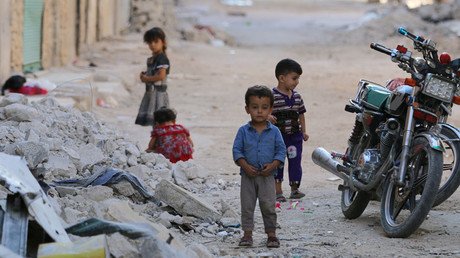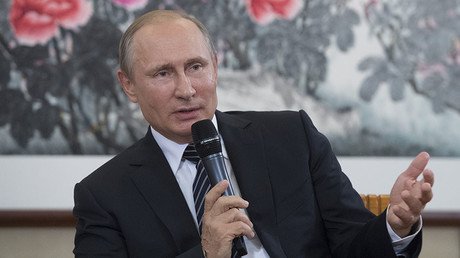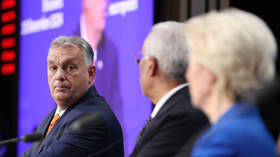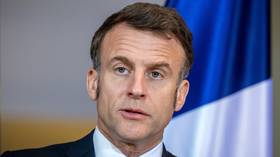Check mate? Russia continues to stack up military & diplomatic wins in Middle East
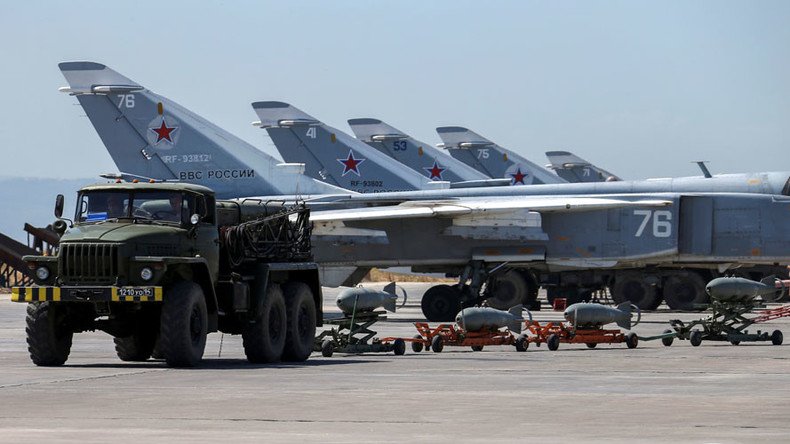
Moscow’s engagement in the Middle East is about more than simply its national interests. It’s about sending a message that the rules of the game have changed; that the unipolar world is in its twilight years.
Russia’s presence and influence in the Middle East since the collapse of the Soviet Union has been extremely limited. For context, during the early years of Boris Yeltsin’s rule, even the former Soviet bloc was disregarded as a foreign policy priority for the new Russian Federation. Instead, Yeltsin and his foreign minister Andrei Kozyrev focused on securing Russia’s entry into Western international organizations. Committed to a fully Western course, Yeltsin and Kozyrev supported sanctions on Iraq, Libya and Yugoslavia, initially supported the US bombing of Iraq in 1993 and began to neglect relations with Asian and Middle Eastern nations.
In recent years, however, as Moscow regained its economic and military strength, and as it became clear that Russia was not a desired member of the Western club of nations — that all began to change. The winds of change had already begun to blow in the late 90s when Kozyrev was replaced as foreign minister by Yevgeny Primakov, but economically and geopolitically weakened as it was, there was very little Moscow could do at that time to influence external conflicts. Fast-forward a few more years and Russia could finally begin to etch out a new, independent role for itself in the Middle East.
While many observers characterize the fraught relations between the United State and Russia as a push and pull between a superpower and a re-emerging superpower, there’s a crucially important distinction between the two countries: While Russia certainly sees itself as a world power again, it does not see itself as a superpower. Indeed, Vladimir Putin himself just recently admitted that the US remains the only global superpower: “America is a great power. Today, probably, the only superpower. We accept that.”
Such a comment — a public acknowledgement of the limitations of his power — from a man we’ve been told is dead-set on a worldwide imperialist adventure, might surprise many Western observers. But it’s exactly that realism which has allowed Russia to re-engage productively in the Middle East without too much of the self-aggrandizement that could have weighed it down. That, and a string of American failures in the region, has allowed Moscow to do a lot in a relatively short space of time.
Successful Syria gamble
Russia’s military intervention in Syria on behalf of the Syrian government has been limited and calculated. Moscow achieved a number of its major aims fairly quickly: The intervention provided the impetus for a massive diplomatic shakeup and allowed Russia to demonstrate that it is a modern military power capable of turning the tide in a complex conflict which affects its national interests.
In a matter of months, Russia’s military campaign shifted the balance in favor of Bashar al Assad’s government forces and Moscow became an indispensable player in the conflict. In doing so, particularly with the liberation of Palmyra from ISIS forces, Moscow also made gains in the so-called information war. While Russian policy has remained consistent, Washington has been left scrambling to clarify its own support for anti-Assad opposition rebel forces. When Russia’s bombing campaign revealed US-supported forces to be fighting in many instances alongside terror groups like Jabhat al-Nusra, even many Western observers suggested that Washington needed to reevaluate its strategy and called on the US to work with Moscow to focus on destroying ISIS, the common and most pressing threat.
Though there has been no major diplomatic breakthrough yet, overall, the Russian intervention which came as a shock to many, is now widely regarded as a game-changer in not only the Syrian conflict, but in the dynamics of Middle Eastern power relations.
Normalization of relations with Turkey
When Turkey shot down a Russian military jet last winter after it allegedly crossed into Turkish airspace for a mere 17 seconds (a claim disputed by Russia), that looked like the abrupt end of any sort of civilized relations between Moscow and Ankara.
The spat became intensely personal, with Putin accusing Erdogan of stabbing Russia in the back. Russia then accused Turkey of aiding ISIS and Erdogan personally of profiting off illegal ISIS oil trade. Relations between the two countries frankly could not have been any worse. Then, seemingly out of nowhere, Erdogan sent a letter apologizing to Russia over the incident and expressing a desire for the normalization of relations. Putin accepted the apology.
Whether Erdogan was sincere in his apology and rapprochement with Russia is up for debate, but the move proved that the Turkish president knew he would at some point have to fall on his sword and normalize relations with Moscow. The new detente also proves that Putin is willing to be pragmatic, find common ground and work with almost anyone. Despite supporting opposing sides and long-standing disagreements over how the Syrian conflict should be resolved, Russia and Turkey have managed to restore bilateral relations — something which only a few months ago seemed out of the realm of possibility.
In recent days, with the Turkish incursion into Syria (in an effort to push back both ISIS and Kurdish forces from its border) it remains to be seen how the rekindled friendship will withstand Moscow’s latest sharp criticism.
Broader alliance with Iran
Then there’s Russia’s relationship with Iran, which has been a rocky one in both distant and recent history. When Russia stopped the sale of its S-300 missile defense systems to Iran in 2010 under Western pressure and supported UN sanctions on the country over its nuclear program, good relations temporarily unraveled. Much has changed since then, that issue has since been settled, and Moscow and Tehran now appear to be seeking out a deeper and broader relationship.
Is it a temporary partnership? Is it an alliance of necessity? There are differing opinions. Some analysts predicts things could turn sour if Iranian oil and gas threaten Russia’s share of the European market. Others say that is unlikely. But what’s certain is that both countries share a couple of fundamental goals: To check US influence both in the region and globally and to ensure the stability of the Syrian state under Assad at least in the short term. To that end, Russia even briefly used an Iranian air base to strike ISIS and other jihadist groups in Syria.
There are likely to be some sticking points between Russia and Iran going forward — Moscow’s improving relationship with Israel being one, and the possibility of a Russian compromise with Washington in Syria that Tehran may feel comes at its expense. For now, however, Russia and Iran are on the same page in key areas of mutual interest.
Israel-Palestine peace talks
Perhaps most interesting is Russia’s emergence as a possible host for peace talks between Israel and Palestine. According to the latest reports, proposed talks in Moscow between Israeli Prime Minister Benjamin Netanyahu and Palestinian Authority President Mahmoud Abbas will go ahead “in principle” — at an unspecified date.
That Russia has found itself in a position to host talks can be counted as another tick in its favor in terms of its image in the region. This comes after vigorous Russian efforts to reach a diplomatic solution in Syria with the US, as well as the key role played by Moscow in talks over the recent Iran nuclear deal.
Russia is now a more “credible” and “balanced” third-party facilitator than the US for talks according to a senior official in the Palestine Liberation Organization. From his perspective, the US is “not at all interested in pressuring Israel” in any way, and Moscow could fulfill a more balanced and “positive role”.
That Russia has managed to improve relations with both Iran, Israel and and cast itself to Palestine as a fairer arbiter for peace talks is a testament to Russian diplomatic efforts. “The Moscow meeting points to Russia's growing influence in Middle Eastern affairs,” writes the Independent.
Walking the tightrope
Moscow has so far successfully conducted an impressive tightrope act in a complex region; it has simultaneously improved relations with countries that view each other as arch enemies, maintained neutral stances on conflicts that aren’t in its immediate national interests, and successfully shifted the balance in its favor in conflicts that are.
So what’s behind Russia’s diplomatic success and growing clout in the region? There are a few things. One is the ability to learn from past mistakes. Russia is not the Soviet Union. Its foreign policy is unencumbered by the burden of spreading any particularly ideology. Unlike the West, it is uninterested in nation building, values promotion or any kind of moralizing.
Second, its use of force is more strategic and limited in its aims. Respected Canadian historian and expert on Russian affairs Paul Robinson put it this way: “Whereas modern Western states often pursue absolutist goals – regime change in Iraq and Libya, for instance – Russia seems to view the purpose of force not as being to destroy its enemies but rather to get them to talk. Once the enemy agrees to talk, Russia is prepared to talk back.”
But Moscow’s engagement in the Middle East is about more than simply its national interests. It’s about sending a message that the rules of the game have changed; that the unipolar world is in its twilight years.
At a time when the United States was actively and publicly attempting to isolate Russia internationally, that it has achieved this level of success in its Middle East policy is undeniably impressive.
The statements, views and opinions expressed in this column are solely those of the author and do not necessarily represent those of RT.

